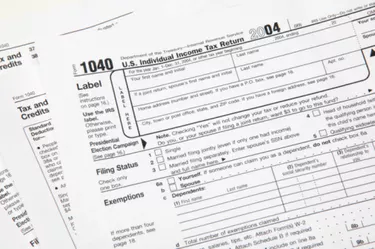
The Internal Revenue Service generally does not allow a wife to sign for a spouse who is out of town. As a result, the departing spouse must either sign the tax return before he leaves or complete a valid power of attorney giving his wife authority to sign on his behalf. There are exceptions for a military spouse who is in a combat zone.
Power of Attorney
Video of the Day
According to IRS tax rules, both spouses completing a married filing jointly federal tax return must sign the return. If it is not possible for one spouse to sign the return because he is out of town, the couple must secure valid power of attorney authorization allowing the wife to sign for the husband. A lawyer drafts this document enabling the nondeparted spouse to sign on behalf of the traveling spouse. This document is attached to the tax return when it is filed.
Video of the Day
IRS Form 2848
If hiring a lawyer to draft a power of attorney authorization is not preferred, you can complete IRS Form 2848 entitled "Power of Attorney and Declaration of Representative." This document requires you to have legal representation, but a qualified student working for a Student Tax Clinic Program is acceptable. A wife signs on behalf of her husband and submits Form 2848 along with the federal tax return when filing.
Military Combat Zone
If your spouse is out of town because he is in a specified military combat zone, you can sign the federal tax return on his behalf. After signing his name on the tax return, include "by" and your name next to the signature. Include a personal letter or military documentation explaining that your husband is in a military combat zone.
Late Return
Since signatures from both spouses are required when filing a joint tax return, it is better to submit the return late and pay the penalty than file the return with only one signature. An unsigned tax return without proper power of attorney documentation is refused by the IRS. Additional penalties and fees are assessed on overdue incomplete tax returns.